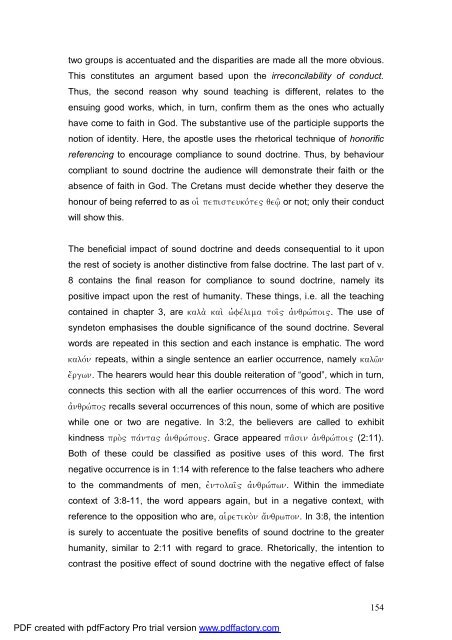A Text centred rhetorical analysis of Paul's Letter to Titus
A Text centred rhetorical analysis of Paul's Letter to Titus
A Text centred rhetorical analysis of Paul's Letter to Titus
You also want an ePaper? Increase the reach of your titles
YUMPU automatically turns print PDFs into web optimized ePapers that Google loves.
two groups is accentuated and the disparities are made all the more obvious.<br />
This constitutes an argument based upon the irreconcilability <strong>of</strong> conduct.<br />
Thus, the second reason why sound teaching is different, relates <strong>to</strong> the<br />
ensuing good works, which, in turn, confirm them as the ones who actually<br />
have come <strong>to</strong> faith in God. The substantive use <strong>of</strong> the participle supports the<br />
notion <strong>of</strong> identity. Here, the apostle uses the <strong>rhe<strong>to</strong>rical</strong> technique <strong>of</strong> honorific<br />
referencing <strong>to</strong> encourage compliance <strong>to</strong> sound doctrine. Thus, by behaviour<br />
compliant <strong>to</strong> sound doctrine the audience will demonstrate their faith or the<br />
absence <strong>of</strong> faith in God. The Cretans must decide whether they deserve the<br />
honour <strong>of</strong> being referred <strong>to</strong> as oiJ pepisteukovte" qew`/ or not; only their conduct<br />
will show this.<br />
The beneficial impact <strong>of</strong> sound doctrine and deeds consequential <strong>to</strong> it upon<br />
the rest <strong>of</strong> society is another distinctive from false doctrine. The last part <strong>of</strong> v.<br />
8 contains the final reason for compliance <strong>to</strong> sound doctrine, namely its<br />
positive impact upon the rest <strong>of</strong> humanity. These things, i.e. all the teaching<br />
contained in chapter 3, are kala; kai; wjfevlima <strong>to</strong>i`" ajnqrwvpoi". The use <strong>of</strong><br />
synde<strong>to</strong>n emphasises the double significance <strong>of</strong> the sound doctrine. Several<br />
words are repeated in this section and each instance is emphatic. The word<br />
kalovn repeats, within a single sentence an earlier occurrence, namely kalw`n<br />
e[rgwn. The hearers would hear this double reiteration <strong>of</strong> “good”, which in turn,<br />
connects this section with all the earlier occurrences <strong>of</strong> this word. The word<br />
ajnqrwvpo" recalls several occurrences <strong>of</strong> this noun, some <strong>of</strong> which are positive<br />
while one or two are negative. In 3:2, the believers are called <strong>to</strong> exhibit<br />
kindness pro;" pavnta" ajnqrwvpou". Grace appeared pa`sin ajnqrwvpoi" (2:11).<br />
Both <strong>of</strong> these could be classified as positive uses <strong>of</strong> this word. The first<br />
negative occurrence is in 1:14 with reference <strong>to</strong> the false teachers who adhere<br />
<strong>to</strong> the commandments <strong>of</strong> men, ejn<strong>to</strong>lai`" ajnqrwvpwn. Within the immediate<br />
context <strong>of</strong> 3:8-11, the word appears again, but in a negative context, with<br />
reference <strong>to</strong> the opposition who are, aiJretiko;n a[nqrwpon. In 3:8, the intention<br />
is surely <strong>to</strong> accentuate the positive benefits <strong>of</strong> sound doctrine <strong>to</strong> the greater<br />
humanity, similar <strong>to</strong> 2:11 with regard <strong>to</strong> grace. Rhe<strong>to</strong>rically, the intention <strong>to</strong><br />
contrast the positive effect <strong>of</strong> sound doctrine with the negative effect <strong>of</strong> false<br />
PDF created with pdfFac<strong>to</strong>ry Pro trial version www.pdffac<strong>to</strong>ry.com<br />
154

















